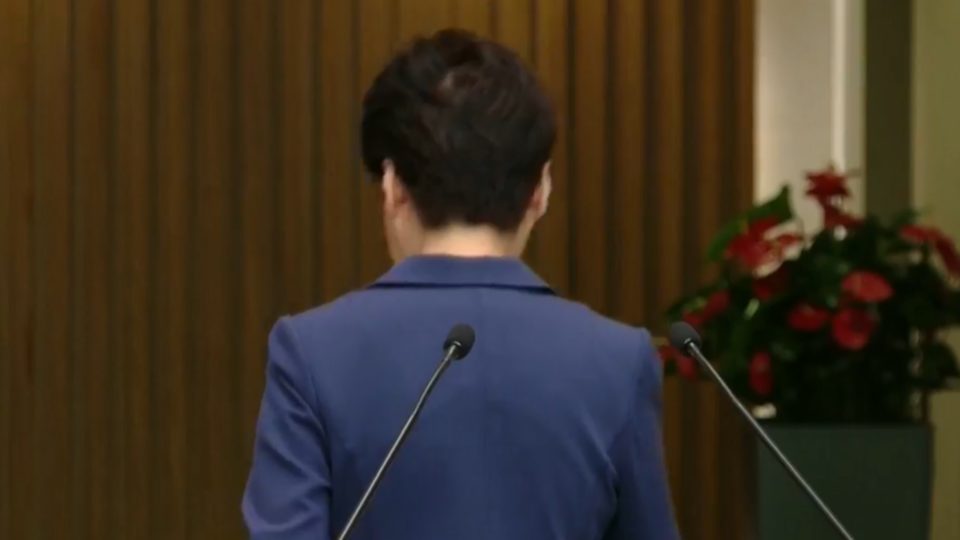Reporters, frustrated by weeks of obfuscation and equivocating, threw protocol to the wind this morning at a briefing with Carrie Lam, lacing into the embattled leader with sharply pointed questions, drowning out pro forma responses, and demanding with an urgency never before seen that she answer for the crisis rocking the city.
Despite having given multiple press conferences since the city’s ongoing protest movement kicked off more than two months ago, Lam has repeatedly refused to engage with protesters’ oft-repeated demands, even while pledging to “listen more” to citizens’ grievances.
Noting that “Hong Kong is entering a critical situation,” Lam went on to rattle off examples of violent and disruptive behavior on the part of protesters, renewing shopworn calls for unity and order.
“There were a number of large-scale malicious, destructive movements in different districts, the MTR was blocked, and the airport was paralyzed,” she said.
Lam also listed a number of “illegal activities,” including protesters’ use of weapons like gasoline bombs, adding that destructive acts carried out in the name of “freedom” and “justice” were jeopardizing the rule of law.
“Protesters also maliciously attacked the police force, including the family members of the police force,” she noted, referring to protesters’ recent siege of a housing complex for officers and their families.
Lam, at one point appearing to choke back tears, went on to urge the public to put their differences aside and help to restore social order, saying, “Rebuilding social harmony will start once everything has quieted down.”
But the remarks were unlikely to satisfy a public desperate for a concrete way out of the current crisis — and they certainly weren’t enough to satisfy the assembled members of the press, who launched into a heated question and answer session the instant she finished her opening remarks.
“You turned the citizens against each other, like what happened during the Cultural Revolution,” one reporter said, asking Lam whether sowing division was a tactic to save her political career, and whether she would tell police to moderate their increasingly heavy-handed response to protests.
Lam replied that the police force had worked hard to keep Hong Kong safe, again stressing the need to “stop with the violence” for society to return to normal.
But Lam’s refusal to denounce recent police tactics didn’t go over well, with one person shouting out,“Shot in the eye! Don’t you think it’s wrong?” in reference to the case on Sunday of a young woman who is believed to have been blinded in one eye by a police bean bag round.
Lam remained supportive of the police force, including their recent use of officers disguised as protesters “to investigate the violent radicals during the protests.”
“Police had to make on-the-spot judgements; they have their code of practice and guidelines regarding their use of force,” Lam said, adding that “the police have had a very difficult time in the last two months.”
One reporter, cutting Lam off, questioned what responsibility she personally bore for the crisis. When Lam, after a beat, replied “Can I continue to answer the—”, the reporter interjected again: “No! What is your responsibility?”
Offering a “solemn and serious response,” Lam said it was her “responsibility to ensure that Hong Kong remains a safe and orderly and law-abiding city.”
“That also means that my responsibility goes beyond this particular range of protests,” she continued. “I have said that after the violence has been stopped, and after the chaotic situation that we have been seeing could subside… I, as the chief executive, will be responsible to rebuild Hong Kong’s economy, to engage as widely as possible, to listen as widely as possible to my people’s grievances, and try to help Hong Kong to move on.”
Protesters have been steadfast for some time in their demands, which include a independent investigation into police violence, genuine suffrage in choosing the city’s leaders, and the complete withdrawal of the controversial extradition bill that sparked the demonstrations in the first place.
While Lam has offered repeated assurances that the bill is no longer on the table — first saying it was on “pause,” and later declaring it “dead” — she has refused to formally and fully withdraw it.
Following Lam’s pledge to “listen,” a Reuters reporter pointedly noted that protesters “have made their demands quite clear,” going on to ask, also pointedly, whether Lam had the “autonomy to decide to withdraw the bill.”
“In other words, have your hands been tied by Beijing… or is this a point of political pride on your part?” the reporter added.
As Lam began by insisting that she had answered the question before, rather than offer a simple yes or no, the reporter pressed again, saying she had “evaded this question on numerous occasions.”
https://twitter.com/TheAPJournalist/status/1161102935922810880?s=20
As Lam again began to offer an explanation echoing the central government’s stance that it still had faith in her administration, the reporter interjected again, insisting that she answer the question.
“Do you have the autonomy or not to withdraw the extradition bill?” the reporter pressed, as others began to clamor in the background.
A moderator finally interceded, saying Lam had answered the question, though the back and forth continued.
Lam finally concluded the exchange, firmly stating, “I have already answered the question,” though in fact, she had not.
As Lam sought to answer another question, reporters continued to interrupt her with more shouted questions, and Lam abruptly ended the conference just a few moments later.




